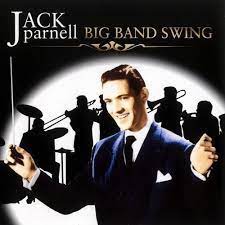
Daily Dose Of Jazz…
John Russell Parnell was born on August 6, 1923 in Paddington, London, England and raised in Wembley. The only son of vaudevillians, his father a ventriloquist, his mother, a gifted classical pianist, worked as her husband’s accompanist. He toured with his parents as a very young child and standing in the wings enthralled by the big bands that were often top of the bill in the late 1920s. He started piano lessons as a four-year-old and could pick up tunes easily. Sent away to boarding school from the age of six, he began to take an interest in drums, and this soon became a consuming passion.
Not much interested in academic study, Parnell bought all the jazz records he could, starting with Duke Ellington and moving on to the more informal Chicago school epitomised by trumpeter Muggsy Spanier. Armed with a Premier drum kit purchased by his mother from the window-cleaner for £15 and following six lessons from Max Abrams, at 15 he ventured north to Scarborough to start his professional career playing for the summer season at the town’s theatre.
During his military service in the 1940s he became a member of Buddy Featherstonhaugh’s Radio Rhythm Club Sextet and played drums with Vic Lewis and other servicemen who were keen on jazz. From 1944 to 1946 he recorded with the Lewis-Parnell Jazzmen’s version of Ugly Child.
During the 1940s and 1950s, Parnell was voted best drummer in the Melody Maker poll for seven years in succession. He composed many television themes, including Love Story, Father Brown, The Golden Shot and Family Fortunes. He was a regular judge on the ATV talent show New Faces and the musical director for The Benny Hill Show.
He was appointed as the musical director for ATV in 1956, a post he held until 1981, and was the conductor for The Muppet Show orchestra for the series’ entire run. Jack composed the score theme for ITC Entertainment. Throughout the 1960s, Parnell directed the pit orchestra for Sunday Night at the London Palladium.
In the 1970s, he co-founded the group The Best of British Jazz with Kenny Baker, Don Lusher, Betty Smith, Tony Lee, and Tony Archer, which performed until 1985. From 1991 on Parnell was part of the Norfolk-based Mike Capocci Trio who backed saxophonists Johnny Griffin, Ronnie Ross, and Kathy Stobart. In 1994, he took over as the leader of the London Big Band.
Drummer and musical director Jack Parnell, whose uncle was the theatrical impresario Val Parnell, transitioned from the effects of cancer at 87 on August 8, 2010 in Southwold, Suffolk, England.
More Posts: bandleader,conductor,drums,history,instrumental,jazz,music,music director
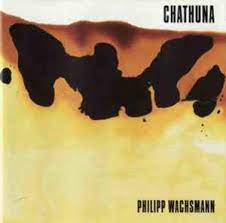
Daily Dose Of Jazz…
Philipp John Paul Wachsmann was born August 5, 1944 in Kampala, Uganda. Influenced greatly by the music of his country he studied violin with Isolde Menges, and music at Durham University, then received scholarships to study violin and composition at Indiana University in Bloomington. He went on to study composition with Nadia Boulanger in Paris in 1968 where he also attended courses in modern music given by Henri Pousseur, and, by Pierre Boulez in Basel. He subsequently lectured at Durham University 1969/70 and then moved to London to start a performing career.
He pioneered new sounds using the violin and electronics and can be heard on over 100 LPs/CDs on different labels including ECM, and plays worldwide. He performs with most of the musicians working in modern improvisation related music. He has performed and recorded with the Stellari String Quartet, The Imaginary String Trio but also works as a soloist.
He regularly conducts his own pieces with the London Improvisation Orchestra, including Three Draft Pistons’ for violin and electro-acoustic tape. He also works with film, dance and architecture. For many years he was Director of the Electronic Music Studio at Morley College and currently teaches courses in composition at the City Literary Institute.
Avant-garde jazz/jazz fusion violinist Philipp Wachsmann gives regular workshops in improvised music at various places and which have been a starting place for many of today’s performers, founded his own group Chamberpot, and has worked extensively in the free jazz and electronica idioms.
More Posts: bandleader,history,instrumental,jazz,piano
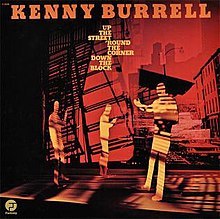
The Quarantined Jazz Voyager
It is up to you to protect yourself, your family, your friends against the Covid variants.
This week’s selection is taking us Up the Street, ‘Round the Corner, Down the Block to listen to a 1974 album by guitarist Kenny Burrell. He recorded tracks 2 & 4 in January 1974 at the Village Recorders in Los Angeles, California and tracks 1, 3, 5 & 6 at Fantasy Studios in Berkeley, California in February. It was released later that same year on the Fantasy Records label.
There were two recording supervisors: Orrin Keepnews on tracks 2, 4, and Sam Russell on tracks 1, 3, 5, 6. The recording engineer was Bob Brown on tracks 2, 4, and Eddie Harris on tracks 1, 3, 5, 6. The remix engineer duties were also performed by Eddie Harris. The lacquer cut was by David Turner. The photography and design was done by Tony Lane,
Track List | 37:44 All compositions by Kenny Burrell except as indicated
- Up the Street, ‘Round the Corner, Down the Block (Onaje Allan Gumbs) ~ 7:18
- Afro Blue (Mongo Santamaría) ~ 5:40
- Sausalito Nights ~ 7:15
- Juice (Gumbs) ~ 5:40
- A Little Walking Music ~ 3:18
- Soulero (Richard Evans) ~ 9:13
- Kenny Burrell ~ guitar, whistling (track 5)
- Jerome Richardson ~ flute, soprano saxophone, tenor saxophone
- Richard Wyands ~ piano, electric piano
- Andy Simpkins ~ bass
- Lenny McBrowne ~ drums
- Mayuto Correa ~ percussion
More Posts: adventure,album,club,festival,genius,guitar,jazz,museum,music,preserving,restaurant,travel
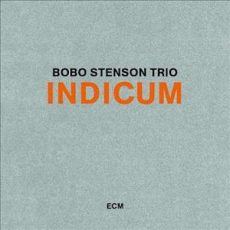
Daily Dose Of Jazz…
Bobo Stenson was born Bo Gustav Stenson on August 4, 1944 in Västerås, Sweden. Starting at the age of 8 he studied with Werner Wolf for 15 years. In 1963, he stepped up from the local scene in his hometown to begin playing frequently in Stockholm. There he accompanied a long line of visiting American players including Sonny Rollins, Stan Getz and Gary Burton. He worked closely with Don Cherry from the beginning of the trumpeter’s residency in Scandinavia.
The 1970s was an intensive period for Stenson, playing in many groups, amongst them the long-standing band Rena Rama with Palle Danielsson, and a trio with Arild Andersen and Jon Christensen. He would later work with Jan Garbarek.
In 1988, he joined the Charles Lloyd quartet and since 1996 has appeared at major jazz festivals with Tomasz Stańko’s septet/sextet. Pianist Bobo Stenson continues to perform to this day.
More Posts: bandleader,history,instrumental,jazz,music,piano
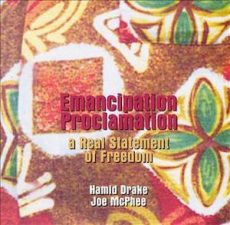
Daily Dose Of Jazz…
Hamid Drake was born Henry Lawrence Drake on August 3, 1955 in Monroe, Louisiana but his family moved to Evanston, Illinois, when he was a child. There he started playing with local rock and R&B bands, which eventually brought him to the attention of Fred Anderson, an older saxophonist who had also moved to Evanston from Monroe as a child decades before. Drake worked with Anderson from 1974 to 2010 including on his 1979 The Missing Link.
At Anderson’s workshops, he met Douglas Ewart, George E. Lewis and other members of Chicago’s Association for the Advancement of Creative Musicians (AACM). Percussionist Ed Blackwell had a great influence on Drake, during this period. His flowing rhythmic expressions and interest in the roots of the music drew like-minded musicians together into a performance and educational collective named the Mandingo Griot Society, which combined traditional African music and narrative with distinctly American influences.
During the Seventies he met Don Cherry and with Adam Rudolph toured Europe and worked extensively with him from 1978 until Cherry’s death in 1995. It was during this period where they explored the interior landscape of percussion and shared deeply in Mr. Cherry’s grasp of music’s spiritually infinite transformational possibilities.
By the close of the 1990s, Hamid was widely regarded as one of the best percussionists in jazz and improvised music. Incorporating Afro-Cuban, Indian, and African percussion instruments and influence, in addition to using the standard trap set, Drake has collaborated extensively with top free jazz improvisers, performed world music and reggae during his career.
Drummer and percussionist Hamid Drake, who also plays the tabla, continues to perform.
More Posts: bandleader,drums,history,instrumental,jazz,music,percussion,tabla



